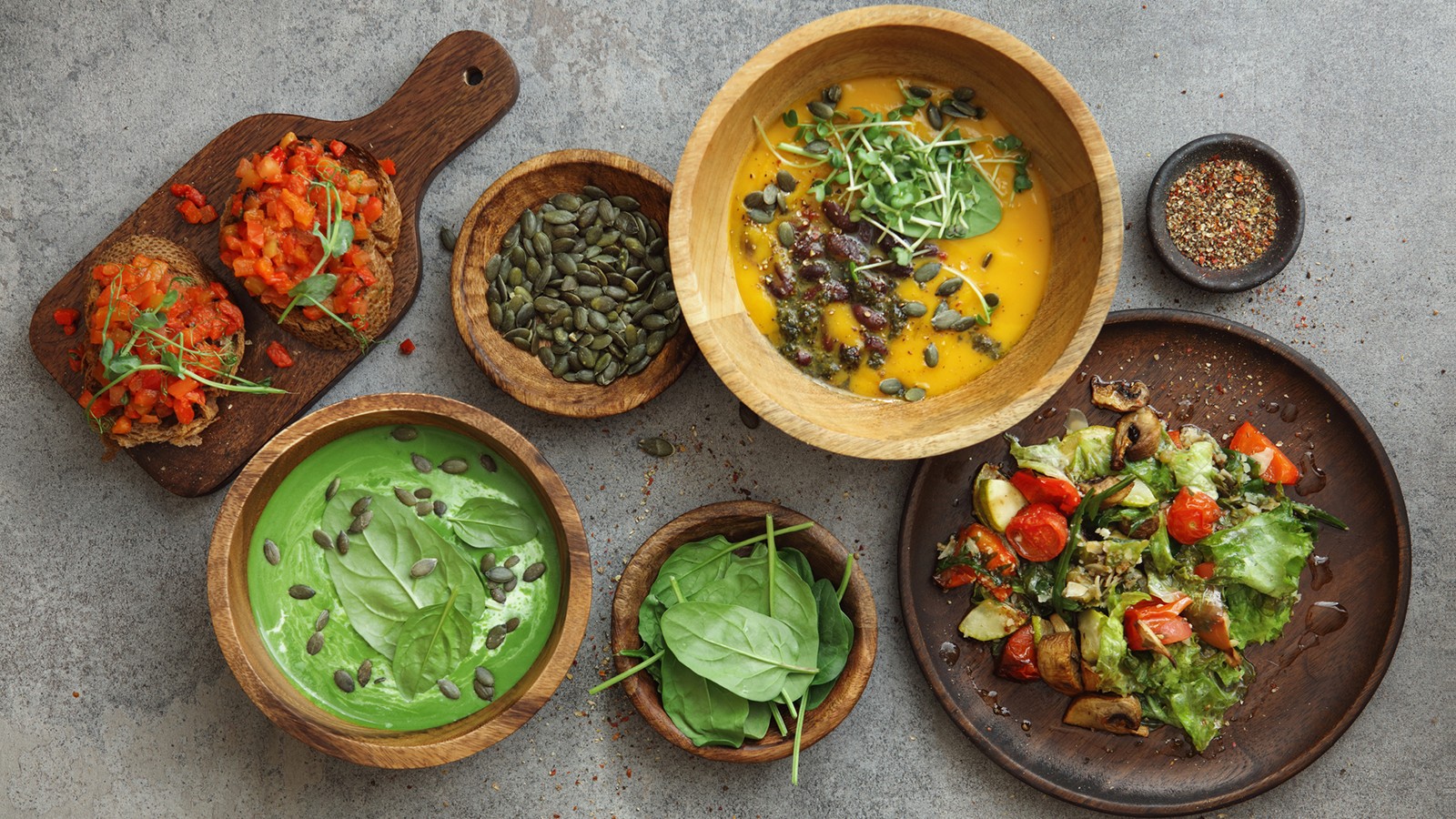The Vegetarian Diet: A Detailed Beginner’s Guide and Meal Plan
Published on April 1, 2021
Medically Reviewed by Ana Reisdorf, MS, RD
The foundation of a vegetarian diet is plant-based foods with limited animal foods. There are many potential health benefits of a well-planned vegetarian diet.


|
Pros
|
Cons
|
Overview
If you are curious about eating less meat, the vegetarian diet might be for you.
There are several types of vegetarian diets, but in general, vegetarians do not eat meat, poultry, or seafood but may consume dairy products and eggs.
Vegetarianism is believed to support weight management and reduce the risk of serious illnesses, including diabetes. (1)
Eating fewer animal products is also believed to be better for the environment.
As a registered dietitian, I believe a vegetarian diet is more customizable and sustainable than many restrictive fad diets.
However, simply avoiding meat, poultry, and seafood won’t result in weight loss alone.
A vegetarian diet that includes plenty of fresh fruit, vegetables, whole grains, healthy fats, beans, and legumes may support weight loss when combined with physical activity.
What Is a Vegetarian Diet?
A vegetarian diet centers on plant-based foods and eliminates all meat, poultry, and seafood. Dairy and eggs may or may not be eaten on a vegetarian diet.
A vegan diet is a type of vegetarian diet. The main difference between a vegan and vegetarian diet is all animal foods, including eggs, dairy, and even honey, are eliminated on a vegan diet.
Vegetarian diets are classified by which animal products are consumed. The five types of vegetarian diets are: (2)
- Lacto-Ovo-Vegetarian: Includes dairy products and eggs.
- Lacto-Vegetarian: Includes dairy products, but not eggs.
- Ovo-Vegetarian: Includes eggs, not dairy products.
- Pescetarian: Includes fish/seafood and may include dairy products and eggs.
- Flexitarian: Includes occasional consumption of meat, poultry, and fish and may include dairy products and eggs. Meat may be eaten once a week, once a month, or just a couple of times a year.
There is no right or wrong type of vegetarian diet to follow. The choice to eat dairy, eggs, seafood, or even occasional meat or poultry is personal.
Some individuals choose to avoid certain animal foods for ethical reasons. Others follow a vegetarian diet because of environmental concerns.
Raising cattle and livestock requires energy and resources like water that some people believe isn’t sustainable to feed the world population long-term.
These animals also contribute to greenhouse gases, which deteriorate the atmosphere and lead to climate change. (3)
Following a vegetarian diet is linked to better overall health with less risk of serious illness like heart disease, cancer, or diabetes.
A plant-based diet like a vegetarian diet can help support digestive health and weight management.
However, simply cutting out meat doesn’t equate to a healthy vegetarian diet.
An individual could eat a diet full of refined carbohydrates like cereals, crackers, chips, pretzels, cookies, and muffins and technically be considered a vegetarian.
However, a high intake of refined grains, sugars, and processed foods is not associated with the health benefits mentioned above.
The healthiest vegetarian diets include meals centered around actual plants.
Eating fewer processed foods and focusing on various fruit, vegetables, grains, nuts, seeds, beans, legumes, healthy fats, plus dairy and eggs provides fiber, vitamins, minerals, and antioxidants that support a healthy weight and immune system.
Benefits of the Vegetarian Diet
A plant-based diet, including vegetarian diets, is linked with improved health. The quality of the vegetarian diet determines the health benefits.
Increased fiber and fruit and vegetable consumption are linked to reduced risk of chronic diseases like obesity, heart disease, type 2 diabetes, and cancer. (4)
Unhealthy vegetarian diets that include processed foods, added sugars, and refined grains may increase disease risk. (5)
Individuals who follow a healthy vegetarian diet long-term tend to have lower body mass indexes (BMI) than meat-eaters. (2)
However, a vegetarian diet will only result in weight loss if an individual also has a caloric deficit.
Researchers reviewed self-reported dietary intake information from thousands of participants in three well-known demographic health studies.
They found individuals who followed a healthy plant-based diet had a lower incidence of type 2 diabetes. (6)
What Foods Can You Eat?
Foods to Include
You can include many plant-based foods in a vegetarian diet.
- Fresh, Frozen, or Canned Fruit (citrus, apples, bananas, pears, grapes, kiwi, melons, berries, mango, papaya)
- Unsweetened Dried Fruit (prunes, apricots, raisins, dates)
- Fresh, Frozen, or Canned Non-Starchy Vegetables (salad greens, bell peppers, cucumbers, celery, onion)
- Fresh, Frozen, or Canned Starchy Vegetables (carrots, corn, peas, potatoes, and sweet potatoes)
- Fresh, Frozen, or Canned Cruciferous Vegetables (broccoli, cauliflower, brussels sprouts, cabbage)
- Mushrooms
- Whole Grains (oats, rice, quinoa, barley, bulgur, farro)
- Prepared Grain Products (bread, pasta, crackers, tortilla, pita)
- Dried or Canned Beans (kidney, cannellini, chickpeas, black, pinto)
- Legumes (lentils, split peas, peanuts)
- Nuts (nut butter, plus raw or roasted walnuts, pecans, almonds, macadamia)
- Seeds (chia, flax, pumpkin, sunflower, sesame)
- Dairy (milk, yogurt, cheese, cottage cheese, cream cheese, butter, sour cream
- Non-Dairy Milk and Yogurt (made from almonds, coconut, cashews, oats)
- Eggs
- Soy (tempeh, tofu, edamame, soy milk)
- Plant-Based Meat Products (i.e., Beyond Meat, Impossible Burger)
- Oils and Fats (extra virgin olive oil, coconut oil, ghee, canola oil, avocado & avocado oil, olives, tahini)
- Condiments (ketchup, mustard, regular or egg-free mayonnaise, salsa, vinegar, maple syrup)
- Vegetable Broth/Stock
- Fresh and Dried Herbs and Spices
Foods to Exclude
On a vegetarian diet, you will eliminate beef, poultry, and seafood. Remember, you also have the option to eliminate dairy and eggs for health or personal reasons.
- Beef and Pork (hamburger, steak, meatballs)
- Cured meats (hot dogs, bacon, sausage, salami, lunchmeat)
- Poultry (chicken and turkey)
- Fish and Shellfish
- Broth or Stock Made from Beef, Chicken, or Turkey
- Bone Broth
- Lard
- Powdered Collagen Supplements
- Condiments Made with Fish Oil or Anchovies (Caesar dressing, Worcestershire sauce)
- Gelatin and Foods Made with Gelatin (like marshmallows)
Other than these foods, a vegetarian diet offers variety and can be extremely flexible.
Foods to Eat Sparingly
These foods are technically vegetarian but should be eaten sparingly.
- Chips
- Candy
- Baked Goods (cake, cookies, muffins, and pastries)
- Refined Grains (bread, pasta, and crackers made from white flour)
- Sugary Cereals
- Soda and Other Sugar-Sweetened Drinks
- Margarine
Processed foods should be limited on all diets, including a vegetarian diet, for optimal health.
Shopping Tips
- Stick to the perimeter of the grocery store. This is where you can typically find nutritious whole foods in their original form, while the inner aisles are for processed foods like snacks, sweets, and soft drinks.
- Pick a few recipes for the week ahead and use them to create your shopping list. Using a meal plan will help you buy only what you need instead of always eating the same foods or buying extra food that you don’t know what to do with.
- Pick fruits and vegetables based on when they’re in season to save money. If a certain fruit or vegetable is out of season, frozen alternatives offer the same nutrition.
- Avoid pre-cut produce, like bagged salad and chopped melon, since you often get less for more money compared to doing the prep yourself.
- Stock up on canned beans. Dried beans are less expensive, pound for pound, but canned saves time compared to soaking and cooking dried beans.
- If you’re avoiding dairy or eggs, be sure to check the ingredient lists on prepared foods.
Sample One-Day Vegetarian Meal Plan
- Breakfast: Two eggs scrambled with tomato, onion, spinach, and cheese with a slice of whole-grain toast topped with avocado and berries on the side
- Snack: A sliced apple with almond butter
- Lunch: Sweet potato and black bean chili with a side salad
- Snack: Hummus with bell pepper strips and cucumber slices
- Dinner: Spaghetti squash topped with mushrooms, marinara sauce, and roasted broccoli
- Dessert: Piece of dark chocolate with a few dried apricots
Sustainability
A vegetarian diet is highly sustainable because it’s easy to follow, affordable, and offers plenty of food variety, which are important factors in sticking with a diet or meal plan.
For many, a vegetarian diet becomes more of a lifestyle than a diet or weight loss method. You can follow a vegetarian diet whether you’re trying to lose weight or not.
You can go all-in with a vegetarian diet or start slowly by increasing the number of plant-based meals you eat in a day or week.
Some flexitarians eat plant-based all day and have a small portion of animal protein at dinner or on the weekends only. Making gradual dietary changes tends to be met with more satisfaction and long-term success.
It’s also a highly customizable and flexible way of eating since there are no hard and fast rules on what you can or can’t eat, and there are no special products required.
Vegetarian options at restaurants and social events may be limited or unhealthy, but this can be solved by planning ahead or asking restaurants to customize menu items.
If you’re interested in a vegetarian diet for weight loss, working with a registered dietitian can help you get started with food lists and recipes.
A dietitian will also make sure you’re eating enough calories for your needs and weight goals and not missing any essential nutrients.
Safety
There are no major safety concerns with a vegetarian diet.
It can be a safe and nutritious diet for everyone, including pregnant and breastfeeding women, children, and individuals with food allergies or chronic health conditions.
There is some risk for developing nutrient deficiencies with a vegetarian diet.
Some vegetarian diets can lack adequate vitamin B12, iron, zinc, and omega-3 fatty acids based on food choices. Calcium can also be a nutrient of concern if you don’t consume dairy products.
Working with a dietitian can help you identify plant-based sources of these nutrients and whether you should take a supplement.
Related: 9 Supplements to Take on a Vegan Diet
The Bottom Line
A vegetarian diet can be a nutritious, affordable, and convenient choice for anyone who wants to improve their health or lose weight.
Plant-based diets are associated with less risk of heart disease, cancer, diabetes, and obesity.
A plant-based diet can help slash your grocery bill since meat and animal products tend to be some of the most expensive grocery items.
But the cost depends on what types of groceries you buy and how many meals you prepare at home versus dining out.
Since so many foods can be included in a vegetarian diet, there’s no way to determine the exact price of following a vegetarian diet for a day, week, or month.
If you’re overwhelmed with starting a vegetarian diet, start small. Instead of replacing every meal and snack with a plant-based option, pick a few meals or days of the week to start with.
There are so many creative plant-based recipes available to replace your favorite meat-based dishes, like creating taco “meat” with nuts or lentils, burger patties with beans, and pulled barbeque “meat” with shredded jackfruit.
If you’re new to vegetarian cooking, I recommend working with a dietitian specializing in plant-based diets and investing in a few vegetarian cookbooks.
Depending on food choices, a vegetarian diet can put some individuals at risk for certain nutrient deficiencies.
Working with a healthcare provider or registered dietitian is recommended to ensure nutritional adequacy.
At WellnessVerge, we only use reputable sources, including peer-reviewed medical journals and well-respected academic institutions.
- The long-term health of vegetarians and vegans - PubMed:
https://pubmed.ncbi.nlm.nih.gov/26707634 - Effects of Plant-Based Diets on Weight Status: A Systematic Review:
https://www.ncbi.nlm.nih.gov/pmc/articles/PMC7533223/ - Effects of Vegetarian Nutrition–A Nutrition Ecological Perspective:
https://www.ncbi.nlm.nih.gov/pmc/articles/PMC3257660/ - Plant Foods, Antioxidant Biomarkers, and the Risk of Cardiovascular Disease, Cancer, and Mortality: A Review of the Evidence:
https://pubmed.ncbi.nlm.nih.gov/31728499/ - Plant-Based Diets for Cardiovascular Disease Prevention: All Plant Foods Are Not Created Equal:
https://pubmed.ncbi.nlm.nih.gov/30895476/ - Plant-Based Dietary Patterns and Incidence of Type 2 Diabetes in US Men and Women: Results from Three Prospective Cohort Studies:
https://www.ncbi.nlm.nih.gov/pmc/articles/PMC4907448/






